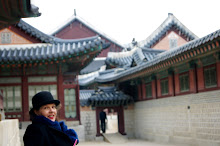Showed you Raymond and Janet in front of the Double Happiness symbol yesterday.
A couple of years back, I sent a Double Happiness gift to my Big Brother and his wife and they asked me if I knew what the symbols actually meant. I thought I did: double joy for both husband and wife. But then, being me, I decided to find out more ... so here is the story behind the Double Happiness symbol:
Once upon a time, many thousands of years ago, in a small peasant village deep in heartland China, there lived a young peasant boy and girl. From toddler-hood they were very close friends.
One day, the local teacher noticed that the little peasant boy appeared to be very clever, so gave him a free education. However, no one, apart from the little peasant boy, noticed that the little girl was also very clever, quite possibly moreso than the little boy, but the little boy passed on everything he learned to the little peasant girl and thus she got a rudimentary education.
Then, when the little boy turned seven he sat the exams for the public service education and passed with flying colours so was taken off to the big city for a proper big-time education. However, before he left, the little girl wrote him a poem called Happiness and told him that if the time ever came when he needed these words, it was a sign he was to return to her.
Many years passed and the boy proved himself an exceptional scholar and when the time came for his final exams he won the top marks in the whole of the country and was welcomed into the Public Service, where he was to undergo his castration ceremony in order to become a Public Official.
However, just before his castration ceremony, the Emperor had a problem. He was composing a poem called Happiness but was stuck on the final verse. With no way around his problem, his advisors told him of an exceptionally clever boy who may have the solution.
So the Emperor called for a meeting with Very Clever Peasant Boy, who, the instant he heard the poem, realised he already had the solution ... the poem given to him by his little friend from his past ... and thus recited the lines the little girl gave him.
It was an exact fit and a very elegant solution, thus the Emperor was thrilled and wished to richly reward the poet. But the honest young boy told the Emperor they weren't his words; they belonged to a little girl.
The Emperor was intrigued so Very Clever Peasant Boy told him the story about his promise. The Emperor was so moved he told Very Clever Peasant Boy that he had to keep his promise and return to the little girl, however only to fetch her and bring her to Court because he wanted to meet her.
Very Clever Peasant Boy did so and the instant he set eyes on little girl again he fell deeply in love and wanted to marry her and spend the rest of his life uncastrated and with her.
But he had promised the Emperor he would return and so he did, bringing Little Girl with him.
And when the Emperor laid eyes on the two of them together he said what he saw was Double Happiness and thus it was wrong for Very Clever Peasant Boy to be castrated in order to become a Public Official. And thus he gave his permission for exemption from the castration ceremony and permission for them both to marry and enter the Public Service together as two parts of the one person.
And this arrangement worked wonderfully and they worked for the rest of their life as a team and were blessed with great riches and success and respect and esteem and a great many very clever children.
And so that's what Double Happiness really means. Joy for both parties, true, but also that two people join together as one and have enormous success and earn great wealth with their very special union.
However, I have just realised this is the exact story of the New Zealand scientist Ernest Rutherford, except without the poetry and Emperors and all that.
I'm not sure yet what to make of this but isn't it very, very interesting. Mmmmm, I see a story emerging here.
Sunday, July 11, 2010
Subscribe to:
Post Comments (Atom)







No comments:
Post a Comment